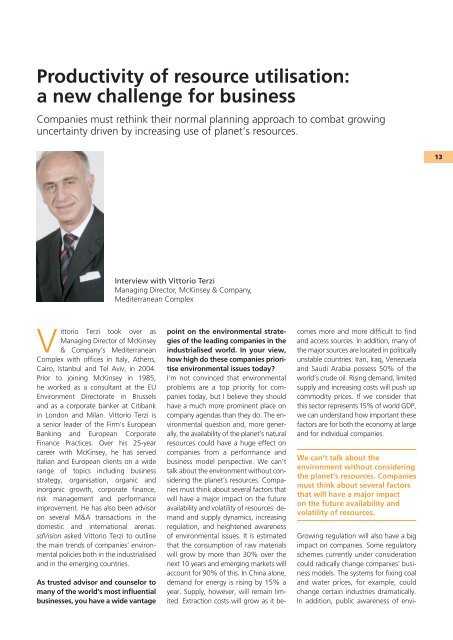SD Vision - Halyps Cement
SD Vision - Halyps Cement
SD Vision - Halyps Cement
Create successful ePaper yourself
Turn your PDF publications into a flip-book with our unique Google optimized e-Paper software.
Productivity of resource utilisation:<br />
a new challenge for business<br />
Companies must rethink their normal planning approach to combat growing<br />
uncertainty driven by increasing use of planet’s resources.<br />
Vittorio Terzi took over as<br />
Managing Director of McKinsey<br />
& Company’s Mediterranean<br />
Complex with offi ces in Italy, Athens,<br />
Cairo, Istanbul and Tel Aviv, in 2004.<br />
Prior to joining McKinsey in 1985,<br />
he worked as a consultant at the EU<br />
Environment Directorate in Brussels<br />
and as a corporate banker at Citibank<br />
in London and Milan. Vittorio Terzi is<br />
a senior leader of the Firm’s European<br />
Banking and European Corporate<br />
Finance Practices. Over his 25-year<br />
career with McKinsey, he has served<br />
Italian and European clients on a wide<br />
range of topics including business<br />
strategy, organisation, organic and<br />
inorganic growth, corporate fi nance,<br />
risk management and performance<br />
improvement. He has also been advisor<br />
on several M&A transactions in the<br />
domestic and international arenas.<br />
sd<strong>Vision</strong> asked Vittorio Terzi to outline<br />
the main trends of companies’ environmental<br />
policies both in the industrialised<br />
and in the emerging countries.<br />
As trusted advisor and counselor to<br />
many of the world’s most infl uential<br />
businesses, you have a wide vantage<br />
Interview with Vittorio Terzi<br />
Managing Director, McKinsey & Company,<br />
Mediterranean Complex<br />
point on the environmental strategies<br />
of the leading companies in the<br />
industrialised world. In your view,<br />
how high do these companies prioritise<br />
environmental issues today?<br />
I’m not convinced that environmental<br />
problems are a top priority for companies<br />
today, but I believe they should<br />
have a much more prominent place on<br />
company agendas than they do. The environmental<br />
question and, more generally,<br />
the availability of the planet’s natural<br />
resources could have a huge effect on<br />
companies from a performance and<br />
business model perspective. We can’t<br />
talk about the environment without considering<br />
the planet’s resources. Companies<br />
must think about several factors that<br />
will have a major impact on the future<br />
availability and volatility of resources: demand<br />
and supply dynamics, increasing<br />
regulation, and heightened awareness<br />
of environmental issues. It is estimated<br />
that the consumption of raw materials<br />
will grow by more than 30% over the<br />
next 10 years and emerging markets will<br />
account for 90% of this. In China alone,<br />
demand for energy is rising by 15% a<br />
year. Supply, however, will remain limited.<br />
Extraction costs will grow as it be-<br />
comes more and more diffi cult to fi nd<br />
and access sources. In addition, many of<br />
the major sources are located in politically<br />
unstable countries: Iran, Iraq, Venezuela<br />
and Saudi Arabia possess 50% of the<br />
world’s crude oil. Rising demand, limited<br />
supply and increasing costs will push up<br />
commodity prices. If we consider that<br />
this sector represents 15% of world GDP,<br />
we can understand how important these<br />
factors are for both the economy at large<br />
and for individual companies.<br />
We can’t talk about the<br />
environment without considering<br />
the planet’s resources. Companies<br />
must think about several factors<br />
that will have a major impact<br />
on the future availability and<br />
volatility of resources.<br />
Growing regulation will also have a big<br />
impact on companies. Some regulatory<br />
schemes currently under consideration<br />
could radically change companies’ business<br />
models. The systems for fi xing coal<br />
and water prices, for example, could<br />
change certain industries dramatically.<br />
In addition, public awareness of envi-<br />
13


